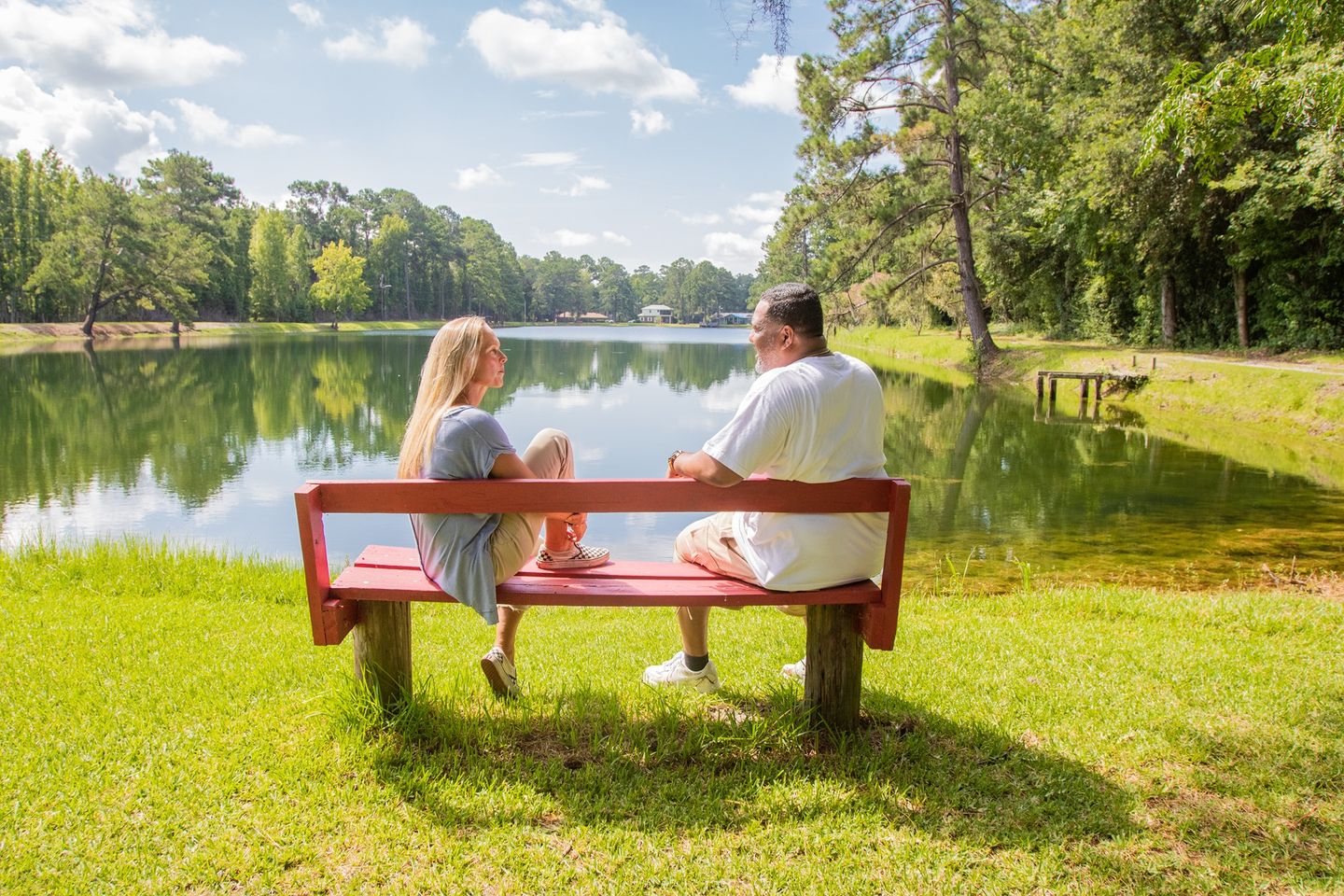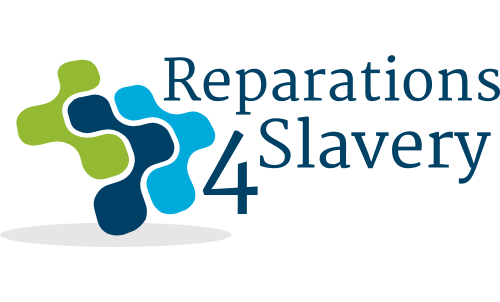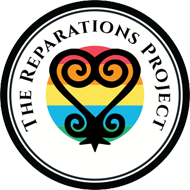Interview with Randy Quarterman and Sarah Eisner

R4S: Sarah, you and Randy are working together in a reparative relationship; together, you have recently established the Quarterman & Keller Foundation and The Reparations Project. What initially compelled you to contact Randy?
Sarah: Well, my family is connected to Randy’s family through enslavement; my Keller ancestors enslaved Randy’s Quarterman ancestors. At emancipation, my ancestors gave the Quartermans land; in fact, I have family records dating from right after the Civil War that showed our families living next to each other. I was really hopeful, once I heard that the Quarterman family was still in the area, that I could meet them and give them these records. Then, when I found out that Randy’s property in Monteith and Port Wentworth, GA, was in danger, I saw a way we might work together.
R4S: Randy, what was your first impression of Sarah?
Randy: Sarah wasn’t hesitant; her email was straight forward so I decided to respond. As I got to know her, it became clear that Sarah was going to address whatever came at her. I saw that she was ready. I’m a combat veteran, I know the eyes of a person, I have that training. So, when I looked into Sarah’s eyes I just knew. And to be ready to work with Sarah, I had to look inside myself and ask, “Is she the reason why I'm held back? Or is it the system?” Over time we’ve been working these things out and our relationship has flourished – we’re almost family now, right? I call her my big sister.
Sarah: Randy is remarkably open and generous with his feelings. One of the challenges we face together is a certain tension around staying authentic and vulnerable in telling our story, but also pushing to achieve our goals. This gets especially complicated when we’re bringing our message to corporate environments, hoping to collaborate or bring on partners. The whiteness in my nature make me want to push; yet I've learned by watching Randy, to wait and be patient.
R4S: What family records did you share with the Quarterman family?
Sarah: Many of my ancestors were storytellers and kept diaries that really describe what life was like back then. I shared those with Randy. I think for me, those were the ‘rawest’ documents because the history becomes so personal, so clear.
R4S: Randy, what was it like to read the accounts of Sarah's ancestors about life in those times?
Randy: It was very eye opening because we don’t have the kind of records or stories Sarah’s family has. What we have is the land.
I asked my dad, “Hey, why don't we ever talk about these things?” He said, “You have to think about the African experience in the Jim Crow era. We couldn't look a white person in the eye, we had to look down at all times, little things like that. It kept us from discussing certain situations because we was afraid of dying.”
A journalist recently asked me, “What does Monteith mean to you? It’s just a bunch of warehouses.” And I told him, “This is my family history. We can only trace our steps back to these shores, and maybe to our last “master.” So, if this area is taken by eminent domain, our history is gone.”
R4S: Storyteller Patt Gunn has worked with you to develop the vision for the project. How did you meet her?
Randy: I found Sister Patt Gunn through her Underground Tours of Savannah program. She’s also the founder of the new Savannah Gallery on Slavery and Healing. Even before we went on the tour, I met her at the library and I told her about Sarah having contacted me, and our goals to save the property and build an education center.
Sarah: Patt has really helped us envision and dream together. She’s an amazing storyteller, a magical soul. She listened to us and was the first to say, “This is bigger than the land.” She worked on a document and said, “I'm giving this to you as a gift; this is a dream for creating a foundation.” She helped us form these ideas and bring life to them, sort of a spiritual midwife for our work together.
R4S: She also helped you connect to the spirits of the ancestors on the land. How did that connection inform your work?
Sarah: There was a formerly enslaved woman, Rachel Butler, who was beloved by my family, and is buried there in the cemetery. My first experience with the site’s history was going to that cemetery, seeing Rachel Butler's grave, and experiencing a deep sadness. That experience has definitely inspired and motivated me.
R4S: Randy, do you also encounter spirits on your land?
Randy: In a certain way, yes. My grandfather bought the land that my father lives on, and that my two aunts have a house on. There's a well there; it’s the first well that Blacks were given water from. So being spiritually connected to places like that on our land is something I’ve experienced throughout my life.
R4S: Sarah, you have pledged a significant amount of resources to make this foundation happen. What are your goals in establishing this foundation with Randy?
Sarah: My first impulse was to pay redress to the Quarterman family and other descendants of those my ancestors enslaved. Then I hoped to help save the Monteith area, if at all possible, and put up monuments for Black-owned land, wherever it exists, in Port Wentworth. Then, the vision quickly expanded to higher education and looking at solving broader legal land redress issues. Our vision keeps expanding, but those are the basic goals.
R4S: Randy, have you experienced any pushback on this mission?
Randy: Honestly, my first experience with folks who didn't support this work was with my own people. I asked a Black lawyer for his advice and after paying the consulting fee, he just said, “Hey, you definitely have a situation here, but I don't want to get involved.” We have had this response multiple times; a lot of people don’t want to touch it. A parkway is being built – this is an eminent domain issue - so a lot of folks didn't want to brush up against the Department of Transportation. So, that hurts me more than if a white person gave me pushback.
R4S: Sarah, what's it been like for you, coming up against Southern white supremacy?
Sarah: Well, it's been emotionally devastating, but totally unsurprising. And in nearly every case, it shows up as white people acting perfectly nice, but refusing to help us.
I’ll give you an example: I realized that all of my family’s historic plantation land had been donated to the Georgia Baptist Foundation and then sold by them and turned into a trust for low income students from the area. I started asking, “Great, how many of these students are black?” The Georgia Baptist Foundation responded, “Oh, we don't keep that kind of information.” Then I visited and it was pretty clear: the students were all white, the administration was all white. So, we tried to get some of the money made on our slaveholding land directed to Black education. That began a month's long process of talking to high level people in the Foundation, as well as local white church leaders. It soon became clear they would not help us fight to redirect some of these funds toward Black education. So, we changed course and did that on our own.
Another example that’s been infuriating is dealing with attorneys regarding the Quarterman’s heirs property situation. We’ve even received referrals to attorneys who we’ve then learned have previously railroaded Black families off their land. It’s been a real minefield. And, if we’re having this much trouble - even with the help of local connections and an ability to pay legal fees - I can imagine what it’s like for other Black families trying to find representation.
R4S: Tell me about the Social Justice Scholars program.
Sarah: We’ve just funded 11 scholars through the Quarterman & Keller Social Justice Scholars program we set up in collaboration with Spelman, Morehouse, and Clark Atlanta HBCUs. The scholars will engage in social justice engagements and activities supported by the Truth, Racial Healing and Transformation Center established at Spelman College.
They'll work in Savannah, do oral histories with Randy's family and some with mine, and also collaborate on projects with Patt Gunn. This is The Reparations Project’s first educational initiative — we are extremely excited about it!
R4S: Randy, many white families are wanting to connect with descendants of people their families enslaved to engage in repair. How would you advise people like Sarah to proceed?
Randy: Look into your true hearts and be honest with yourself. Look at the wrongs that have occurred. Addressing them directly is a first step. For instance, the information that your family may have is really important – many Black families don't know about this history. They don’t even know that these records exist, or that this history has been hidden from them.
Sarah: I would just add, be kind to yourself and true to yourself. Keep asking questions because there's no shame in learning the truth; there's only shame in turning away from it.
R4S: Final thoughts?
Sarah: Be lucky enough to connect with someone like Randy. Nothing we’ve accomplished here with The Reparations Project would have been possible without Randy and his openness and generosity in being willing to help in my healing as well as his own. In the end I’m not fighting for Randy—he can do that well on his own—I’m fighting for my own humanity, for my family’s humanity, and for the country as a whole.
Randy: Sarah and I are investing in the future; I’m thinking about what we’ll have accomplished 50 to 100 years from now. If we could all collaborate like this, then I think there would be no stopping us from achieving our goals, Black and white, together. Working with Sarah, seeing her commitment, I’m telling you, that’s warmed my heart.
Personal Reparations 2: Black Wealth, White Saviorism, and H.R. 40
Personal Reparations 3: Heirs Property, “Safe” Words, and ‘Slave Play’

